

THINGS YOU SHOULD KNOW
STROLLIN’ DOWN MLK STREET
The story imagines what may happen if Rev. Dr. Martin Luther King Jr., and his wife, Coretta, reflected on life in 21st Century America, making their observations by walking along any thoroughfares named in his honor.
Written by Michael Edgar MyersPresented by Kingdom Impact Theater Ministries
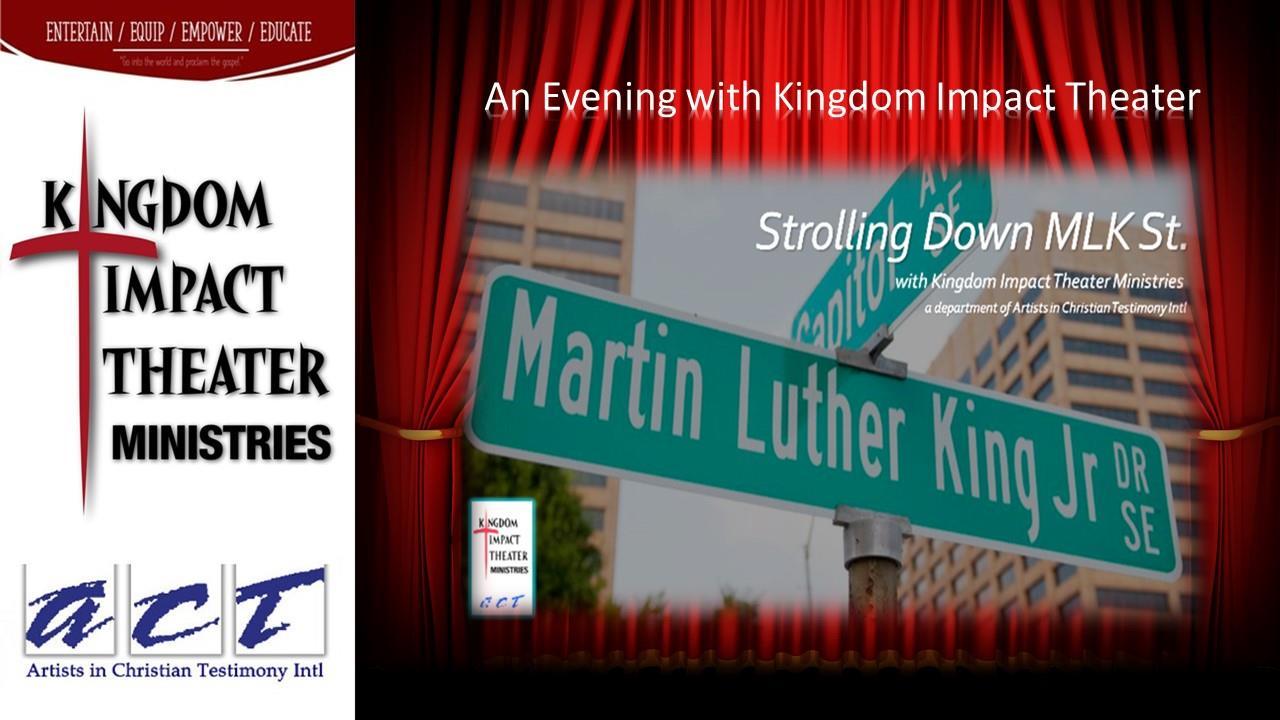
ABOUT THE SHOW
“Strollin’ Down MLK Street” imagines what may happen if Rev. Dr. Martin Luther King Jr., and his wife, Coretta, reflected on life in 21st Century America, making their observations by walking along any thoroughfares named in his honor.
“Strollin’ Down MLK Street” was written by Kingdom Impact Theater Ministries at the request of the Hoffman Estates Cultural Awareness Commission and debuted January 21, 2018 as part of the Commission’s 17th Annual MLK Celebration.
THE ORIGINAL CAST
Michael Edgar Myers
Vikki J. Myers
Musical Accompaniment: Garlan Garner


The


A
MEMo From Michael Edgar MyersHow the Script Came About
The contents of this guide are compiled from research, isolated thoughts, historical tours, memories, and work/vacation photo safaris of adulthood that began emerging one autumn afternoon in a spur-of-the-moment to visit a pastor friend at his church in the historic Bronzeville community of Chicago is a few blocks from Dr. Martin Luther King Drive.
Originally named Grand Boulevard, then South Park Way, the thoroughfare was one of the first in the country renamed in King’s honor – in 1968, a few months after his assassination; just weeks before the city hosted the Democratic National Convention National Convention. The decision was compassionate, controversial. And political. All hallmarks of King’s lifetime of work.

My talk with Pastor Michael Neal, himself a King-like activist preacher, including kicking around how our suburban-based ensemble of theater missionaries, Kingdom Impact Theater Ministries, may partner with his Glorious Light Church to creatively proclaim the Gospel of Jesus Christ in the city. Pastor Neal even pointed out potential summertime performances that could be done in the shared lot of the facility next door – Martin Luther King High School.
Knowing an hour-drive awaited me, he recommended a restaurant on King Drive that I may enjoy while waiting for rush hour traffic to thin. The stately brownstone homes and painted murals en route merited more than drive-by glances. I parked a few blocks away to take in closer looks on foot, a benefit after lunch because my auto was already full of gas.
Heading home, I drove-walked-photoed when neighborhood artistry beckoned. As the landscape changed to less aesthetic, my mind also wandered, even leaving town. I began imagining Dr. King taking in the sites on his namesake street in Chicago and other cities where I’d travelled.

My walk along King Drive, my travels across the country, my passion for things historical, my memories of April 4, 1968 began melding into a story outline we that became, “Strollin’ Down MLK Street.”


The Gentleman Caller
As Providence plans, not long afterwards, a gentleman named called who was organizing his community’s annual Martin Luther King Day event. We did not meet Demetrius Gibson until driving to his home – two suburbs away. He’d found us on the Internet. Because many of our scripts focused on connecting African-American and Christian histories, he wondered if Vikki and I may be able to create a new piece with Martin Luther King as the subject for a multiethnic audience, like, 15 minutes from our home.
The outline was fleshed into a one-act play providing opportunity to collaborate on stage with Vikki and our musical director, Garlan Garner. For presentation purposes we built on a staging concept we’d found effective in other shows in what we call The Historical KIT. We include multimedia of historical photographs, news headlines, and, when possible, photos from my own travel. Visuals, we’ve found, keep the young people engaged, especially when talking history.

Also when producing history plays – period pieces we’ve learned there are people, places and things that modern audiences don’t understand, therefore without context, the most well-crafted dialogue or most potent visuals will not communicate. The same is true when writing scripts about matters of faith. Having a frame of reference for history AND faith are most critical in performance…if for no other reason than for the audience to laugh when humor relief is provided. Laughter is the caffeine of live theater.
Coming to a Street Theater Near You
The Stroll, The Call, The Audience merge in this document designed to capture the multi-media essence of the show. Photos and interactive hyperlinks aligns with the Kingdom Impact Theater mission to Entertain, Educate, Equip and Empower.
Thus, you don’t HAVE to read all of this to see the play. In fact, all you HAVE to read are Pages 6-7, “People You Should Know, ” the single-page we hand out given to live audiences. All else written came about because of post-show questions and subsequent conversations. Read it at your leisure in preparation to stroll down a Martin Luther King Street near you.


ABOUT THE GUIDE
The typography of the guide is also a guide for entertainment enjoyment. It’s a mix between reading a stage script and prose literature. Assorted sections include lines of dialogue as they look in the script in Courier New typeface the actors see. Such as:
THE SCRIPT CORETTA
”I saw a movie once. About a young couple. There was a line they kept saying ‘Love means never having to say you’re sorry.’ Remember?”
Followed by biographical or historical commentary in another typeface. There are also still photos used as background in the multimedia stage performance and as part of the video narrative. For further research, we have included links to pertinent websites or documents. For fun, we have linked videos to music alluded to in the script.
Most importantly are the questions for study or discussion.
Some questions are part of the interactive moments that occur in the script where “Rev. and Mrs. King” mingle with the audience and improvise with the answers in the moment. Other questions are for personal reflection or group conversation. A significant element of the study guide are the scripture verses included with corresponding links. These verses are quoted or alluded to in the show.
We include them for two reasons:
1. Our motto is “The best script is Scripture.” Thus, with each piece we create, it’s imperative to make certain the story is guided by The Word of God as it relates to the events in the piece and daily life.

2. Martin Luther King was a Baptist preacher whose work was informed and guided by his belief in Jesus Christ. Because he is most often referred to as Dr. Martin Luther King, and because even today many people who claim the title “Reverend” don’t have a notable affiliation with a Christian church, the role of Christ is not easily discernible. We include scripture to make it clear that Martin Luther King was a follower of Jesus Christ, even though he included the methods of other non-violent leaders of history.


People You Should Know (Before The Show)
Martin Luther King Jr. Jan. 15, 1929 – April 4, 1968
THE SCRIPT CORETTA
“Martin…you made a difference. Still! Even this very day.”
Martin Luther King Jr., born Michael King Jr., was an American Baptist minister and activist who became the most visible spokesperson and leader in the civil rights movement from 1954 until assassinated in Memphis, TN in 1968. Born in Atlanta, King is best known for advancing civil rights through nonviolence and civil disobedience, tactics his Christian beliefs and the nonviolent activism of Mahatma Gandhi helped inspire.
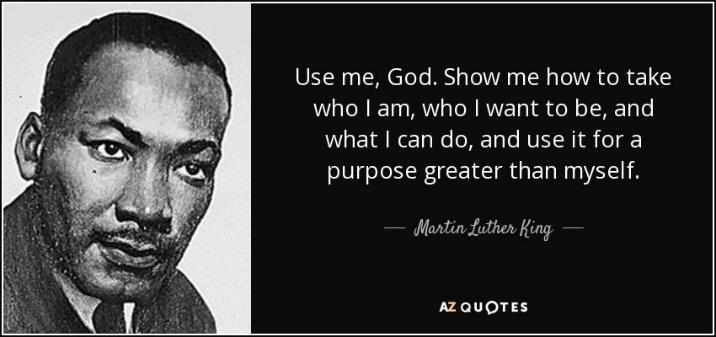
Coretta Scott King
April 27, 1927 – January 30, 2006
THE SCRIPT MARTIN
“Dreams become reality through preparation, sacrifice…and a helpmate.”
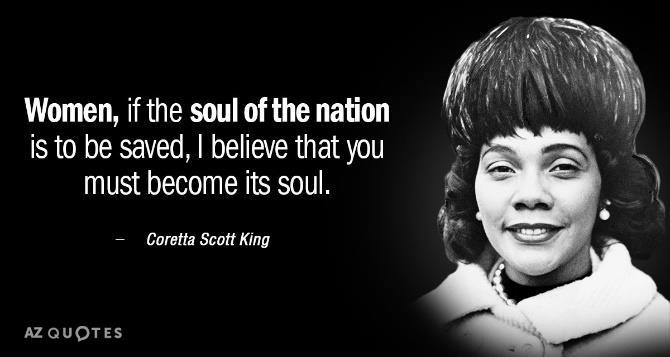
Coretta Scott King was an American author, activist, civil rights leader, and the wife of Martin Luther King Jr. Coretta Scott King helped lead the Civil Rights Movement in the 1960s. She was an active advocate for African-American equality. King met her husband in Boston while she was attending graduate school and he was pursuing his doctorate. They both became increasingly active in the American Civil Rights Movement. She was also a singer, and often incorporated music into her civil rights work. They married in 1953.


People You Should Know (Before The Show)
Martin Luther November 10, 1483 - February 18, 1546
THE SCRIPT
CORETTA
“You were both born to be rabblerousers which is why Daddy King changed your names.”

Martin Luther was a German professor of theology, a priest, author, composer and Monk. As a Catholic priest he questioned the processes and leadership of Pope Leo X. He expressed his protests in a series of Biblicallybased questions and ideas to reform the Catholic church. These became known as Luther’s 95 Theses, the most inflammatory challenging Pope Leo’s status as the only person who could interpret Scripture. Martin Luther’s theses established two theological ideas: Protestantism, denominations of believers in Jesus Christ whose methods of worship differ from Catholic methods; Lutheranism, the denomination of Protestant believers whose worship and study are similar to Luther’s original interpretations.
A. Philip Randolph April 15, 1889 – May 16, 1979
THE SCRIPT
MARTIN
“If anybody should have a holiday it should be Brother Randolph. They don’t know about him. Even on King Street.”
Asa Philip Randolph was a leader in the Civil Rights Movement, the American labor movement, and socialist political parties. In 1925, he organized and led the Brotherhood of Sleeping Car Porters, the first predominantly African-American labor union. He proposed a March on Washington for jobs in 1941 to change unfair labor practices in relation to people of color, but convinced President Franklin D. Roosevelt to issue Executive Order 8802 banning discrimination in the defense industries during World War II. Randolph resurrected the idea to organize the 1963 March on Washington and was the emcee.


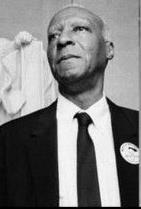
Things You Should Know
THE SCRIPT MARTIN”Sometimes I wonder if all they know about me is That Speech and Memphis.”
Public Perception
• Martin Luther King was not as popular when he lived as he became after his assassination.
• His birthdate, January 15 (1929) became a national U.S. holiday in 1983 during Ronald Reagan’s presidency. However, the date was not recognized in all 50 states until 2000.
• He was criticized by black and white contemporaries. He was criticized as a civil rights advocate because he either moved too fast, or too slow.
• He was criticized as an American citizen by individuals who thought he should only protest about civil rights and not politics, economic or military matters.
The Streets
• More than 1,000 roadways worldwide honor Rev. Dr. Martin Luther King Jr., a reflection of his enduring impact across cultures.
• The first street renamed in his honor occurred less than a week after his assassination, April 4, 1968. This was in Haarlam in the Netherlands.
• There was not a street named for him in Memphis, the city where he was slain, until 2012.
Personal Life
• His name was changed by his father, Rev. Michael King Sr., who visited Germany in the 1930s and became fascinated by the radical, non-violent work of 16th century monk Martin Luther. “Daddy” King also changed his own name in honor of Martin Luther.
• As happened with Martin Luther, followers of Martin Luther King were prone to violent rebellion countering the principles of their founder.
• King’s work later expanded to include economic and social injustice, which included, to him, opposition to the war in Vietnam.


Things You Should Know
Education and Activism
THE SCRIPT MARTIN
“I dream that children partake of the advantages afforded this nation…”
Education and Work Credentials
• Freshman, Morehouse College, Atlanta, 1945. Age 15.
• Graduate, Morehouse, 1948: Bachelor of Arts (Sociology), Age 19.
• Graduate, Crozer Theological Seminary, Chester, PA, 1951: Bachelor of Divinity, Age 21.
• Graduate, Boston University, 1955: Doctorate of Philosophy in Systematic Theology, Age 26.
• Pastor, Dexter Avenue Memorial Baptist Church, Montgomery, AL,1954-1960.
Influences
• Henry David Thoreau, 19th century author
• Benjamin E. Mays, pastor, president, Morehouse College
• Mahatma Ghandi, lawyer, non-violence activist
Educational Background: Sparknotes Biography
Controversies
• King’s alliances with multi-ethnic coalitions led to charges that he was a Communist. This fear led to investigations and wiretaps by the Federal Bureau of Investigation.
• The wiretaps were approved by attorney general Robert Kennedy hoping to disprove theories of Communist infiltration, as feared at the time as the fear of terrorist cells today.
• The wiretaps exposed that King had extra-marital affairs. Recordings of these affairs were sent to his wife hoping the embarrassed Kings would stop their civil rights work. They did not.
• The tapes showed King was as vulnerable to temptation as any man; and that the Kings had marital challenges, as any couple. They remained a couple.
• After King’s assassination, Mrs. King took up his causes and became more vocal about injustice and continued so until her death.
Events
in
1968
Rev.
King Did Not Live To See
Robert Kennedy Killed Riots at Democratic National Convention
Mexico City Olympics Boycott Richard Nixon Elected President
First Manned Flight to Moon and Back to Earth The move “Love Story”


Social Justice & Theological Impact: The Summer of ‘63
Southern Christian Leadership Conference (SCLC)
THE SCRIPT MARTIN“Do the streets proclaim that I’m a Reverend for the gospel of Christ? How that influenced the work of the Southern Christian Leadership Conference?
The SCLC, a coalition of Negro ministers and social activists, formed in 1957, an outgrowth of the recently-completed Montgomery Bus Boycott that brought Rev. King and Rosa Parks to prominence.
The SCLC was committed to mixing faith, non-violent protest, social activism and legal resolutions to end segregation. This mix was often criticized, especially among African-Americans. Congregations argued churches should have only a spiritual role in civic matters. Younger black activists were more eager to meet violence with violence as the 1960s developed. SCLC decisions were inspired, in part, by ideas Rev. King adapted from the Billy Graham Evangelistic Assn. Although friendly with many Southern segregationists, Rev. Graham was a clandestine SCLC advisor.

Letter from A Birmingham Jail
THE SCRIPT CORETTA”That was your Jesus-clearing-the-temple moment.”
In April 1963, eight white religious leaders in Birmingham, AL, issued a statement acknowledging racial segregation should be dealt with, but that non-violent protests endangered the community and should be toned down. Dr. King, jailed for leading such protests, broke his rule of not answering to criticism and crafted a began writing his response in longhand on a legal pad The Christian Century magazine published King’s letter, which included historical, cultural illustrations of civil disobedience underscored by Old and New Testament examples. King’s letter was published first in The Christian Century magazine and later became required reading in many college literature programs.

Text: A Call for Unity, concerns from eight religious leaders, April 12, 1963 (Good Friday)
Text: Letter from a Birmingham Jail, Martin Luther King’s response, April 16, 1963


“I Have a Dream” Speech
THE SCRIPT MARTIN“The recite it! They memorize it! But do they KNOW it? Do they LIVE it?”
On August 28, 1963, over 250,000 spectators witnessed the speech that concluded the March on Washington for Jobs. The spot from which Rev. King spoke on the steps of the Lincoln Memorial overlooking the National Mall in Washington, D.C. is marked for visitors.
Text of “I Have a Dream”

After The Letter; After the Speech
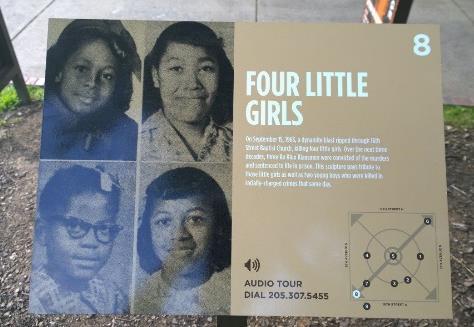
None of King’s words brought immediate healing. On September 15, 1963 two months after King’s letter, two weeks after King’s speech the 16th St. Baptist Church, a Civil Rights hub in Birmingham, AL, was bombed during Sunday worship. Four black teen girls were killed. Four white extremists were arrested and convicted: a process that took from 1977 to 2002.
.Script References to Further Research
Mahama Ghandi
John F. Kennedy
J. Edgar Hoover
Robert Kennedy


Mahalia Jackson
Barack Obama
”The dreams of which I spoke are not my dreams, they are the multitudes who went before me…before us…who stand among us…who will come after.”
Questions You Have
Because of seeing “Strolling Down MLK Street,” what questions do you have, about the show or about the Kings’ lives?
Questions from the Show
• What Did Martin Luther King and Coretta Scott King do that inspires you?
• How have relationships or activities changed in your neighborhood because of the spirit of Rev. and Mrs. King?
• What’s one thing you wish to do that seems impossible, but you still believe you can get it done? What resources do you need?
Music in The Show
Martin Luther King loved music, and both Kings were musicians. Coretta was a classical singer and pianist. Martin played guitar. Singer Mahalia Jackson was a close family friend.
The following songs were referenced in the script. Enjoy the videos.
Soon and Very Soon
Everybody Talkin’ About Heaven Ain’t Going There
Free at Last
The Stroll (Dance Illustration) – Dick Clark’s American Bandstand (1968)
The Impossible Dream – Brian Stokes Mitchell


Conversations For Talk or Journaling
• What does “content of their character” mean to you? List positive character traits. How do you, your family or friends honor Dr. King by living by these character traits.
• If you are not African-American, using Dr. King’s life as a model, who are the individuals from your cultural heritage you recommend your friends learn about?
• What facets about Rev. King’s faith do you understand differently or for the first time? How do your faith, religious or spiritual experiences influence your behavior or community participation?
Scriptures in the Show
The following passages were quoted during the script. Why? Which passage(s) resonate with you? Why?
Mrs. King: “O love the Lord, all ye his saints: for the Lord preserveth the faithful, and plentifully rewardeth the proud doer.” – Psalm 31:23 (King James Version)
Mrs. King: “Precious in the sight of the LORD is the death of his saints.” – Psalm 116:16 (King James Version)
Rev. King: “If my people, which are called by my name, shall humble themselves, and pray, and seek my face, and turn from their wicked ways; then will I hear from heaven, and will forgive their sin, and will heal their land.” – 2 Chronicles 7:14 (Multiple Translations)
Rev. King: “I beheld, and, lo, a great multitude, which no man could number, of all nations, and kindreds, and people, and tongues, stood before the throne, and before the Lamb…” Revelation 7:9 (Multiple Translations)


Your Stroll Down King Street

Things To Do
• Stroll (or drive through) a Martin Luther King Street near you. What do you observe? Take photos or sketch images.
• Visit a Martin Luther King or Coretta Scott King community center near you. What activities interest you?
• What national or regional monuments have you visited that honor Rev. or Mrs. King? Plan a live or virtual trip.


The Author’s Final MEMos (questions from his journals)
The seeds for this script were first planted the evening of April 4,1968 at a hotel in Indianapolis, Indiana. As his birthday present, the firstterm mayor of the city later six-term U.S. Senator Richard Lugar, was honoring our high school basketball team for finishing second in the state tournament. The mayor was an alumnus of the school. I was a freshman.

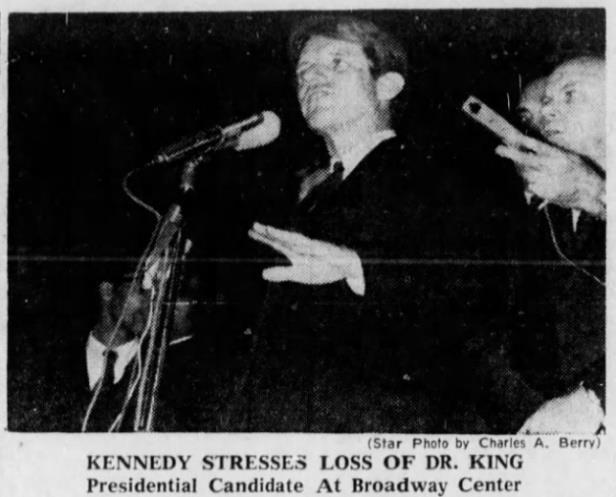
APRIL 4, 1968: Of Basketball and Birthdays
The banquet hall was packed with a who’s who of the city’s media, politicians and athletes. The night was festive, as birthday parties ought be. When the party began, few among us knew that the mayor’s smile was not a birthday grin. It was a mask. His game face. Lugar, a Republican, was struggling to withhold that he had been in communication with Sen. Robert Kennedy, a Democrat, who was scheduled to make a Presidential campaign speech in a neighborhood park a mile away He had been trying to convince Kennedy not to go, and not to tell the audience what they both had just discovered: While we in Indy were getting ready for the celebration, celebrated civil rights leader Rev. Dr. Martin Luther King had been shot dead in Memphis, Tennessee.
Nevertheless, in what is recognized as one of the great extemporaneous speeches in U.S. political history, Kennedy announced King’s assassination to the mostly black crowd, including some schoolmates who skipped the banquet. Kennedy’s speech is credited with helping Indianapolis remain peaceful while other large cities in the nation burned in rioting reaction to the murder. The strain of the evening was seen on his face among our classmates who saw Kennedy at the park, and some who saw him afterwards at the hotel where he was staying…which also hosted our banquet.


FIRST IMPACT
That evening became personal political wakeup call; a bell rung further when Kennedy himself was gunned down two months later and died on the night of the seniors’ graduation.
The next year our school held a commemorative assembly honoring King. The assembly included discussions about whether his birthday should become a holiday, and student essays in the school’s daily newspaper. Questions were raised as:
• Should the U.S. honor a controversial citizen who had media charisma but could also be considered a threat to national security?
• If so, would the holiday be distinct in how the Rev. King would be honored? Or, would the holiday be another commercialized day off?
The holiday conversation continued over the years as I covered legislatures debating the issue, later as the nation finally acknowledged, in 1983, that King’s birthdate, January 15, 1929, could be declared a Federal holiday and rolled into the new conceit of creating three-day weekends. Meanwhile the date, and countless streets, buildings and artwork began appearing across the nation in honor.
THE FAMILY THAT TOURS TOGETHER…
Into adulthood, travelling for pleasure and work, I often found myself at Martin Luther King Memorials, often as family affairs.
My first post-college trip with my parents was to Dr. King’s crypt in Atlanta ten years after his death; and, in masked-up pandemic America, went on a blitzkrieg date with my wife to the same locale, now expanded to be the King Center celebrating the commitment to non-violence of the pastor and his widow, Coretta Scott King, whose remains rest beside him.
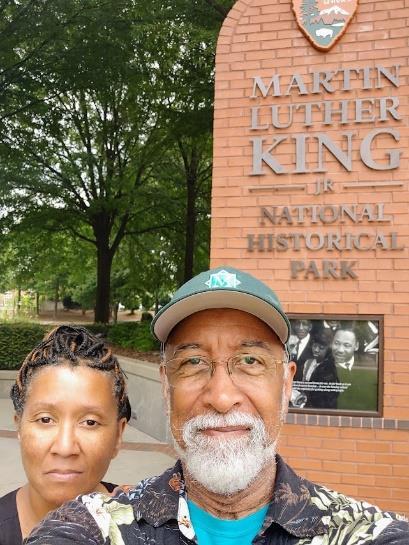



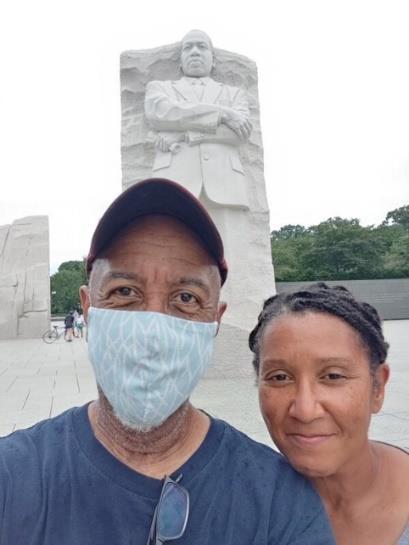
With my daughter’s eighth-grade class, I found myself at his memorial statue in Washington a few weeks after it was unveiled. I’ve made a point of stopping at the statue for reading, reflection and observing people with spouse, in-laws, and ministry colleagues whenever I’m in the nation’s capital. I’ve pondered his bust with our teenaged daughter in the U.S. Capitol, escorted my wife through the memorial in park in Indianapolis where Robert Kennedy announced King’s death. A later trip to the homestead, alone, coincided with a commemorative appearance by Kennedy widow, Ethel, and a son. I made a point of going to the park.
On separate trips to Memphis, I found myself standing along the balcony where he was slain at the Lorraine Hotel, and outside the sniper’s nest across the street from when James Earl Ray fired the fatal shot.
KINGS OF THE ROAD
More sobering than the guided or unofficial tours to historic sites have been the innumerable times I’ve unexpectedly found myself driving or walking along a King Street in some city in any of the 49 United States in which I’ve travelled.
When I noticed a pattern, like a kid playing the license plate game on a family drive, I’d make note of the variations on the name: “King Dr.” “King Drive,” “King Street,” “King Road,” “King Blvd.” “MLK.” The full moniker: “Dr. Martin Luther King Jr. Drive,” squeezed onto a standard-sized street sign. The pattern amused me.

I then began taking notice of other patterns, ironies. How I could go from, “Almost EV’BODY in this state has a Martin Luther King Street!” to weeks without seeing ONE.
I also began noting: other ironies I did not find amusing:
• how the streets were in assorted states of upkeep;
• the frequency with which King Street was mentioned in a crime report;
• when uplifting test scores or athletic successes at schools named for King were offset by reports of schools named King being closed, graffiti-tagged, or struggling with issues of violence involving black students and…well, struggling with issues of violence.
What must Dr. King be thinking, I often wondered, if he could see this?


MODERN TIMES
At the same time, Martin Luther King celebrations became ubiquitous – all over the place – on his birthday and few days afterwards. Then, like Christmas, Martin Luther King and his ideals disappeared from the public- if not out of sight, at least to simmer on a black burner…often until a few days in February where he received his obligatory a Black History Month rerun. My mind whirred editorially:
• The King holiday had become what we feared when first writing about it in high school in 1969…just another three-day extended time off?
• King’s name became invoked by politicians pandering votes, to the extent of justifying their heinous behavior in the spirit.
• “I have a dream” became both a nightmare and a cliché.
The refrain, “What must Dr. King be thinking if he could see this?” echoed afresh as the Black Lives Matter movement emerged in 2012, gained new fervor in 2017, and exploded in the streets during 2020.
BLACK LIVES & OTHER MATTERS
Clergy across the nation began aligning with the issues the BLM founders brought up, sadly because those issues are largely unresolved from when they were the essence of the work of Rev. King and his colleagues Ralph Abernathy, Joseph Lowery, Fred Shuttleworth who formed the Southern Christian Leadership Conference a generation earlier and unchanged from the generation that preceded and inspired King. Issues as overzealous law enforcement, economic inequity, interpersonal disrespect, corporate and educational disparity.

Yet, agreeing with issues, stark differences exist between the images of pastoral leadership in the eras of the SCLC and BLM. Debate surrounds methods, occasionally theological, that separated King from Malcolm X (and Booker T. Washington and W.E.B. Dubois before them); that differentiated between the non-violent movement and the combative Black Panther Party.

From those perspectives – the social and Scriptural – came the question: “Where would Martin Luther King be seen in Black Lives Matters march photos?”
A connected query for Christ-followers aligning with BLM issues is,
“How does the work of Jesus Christ inform their actions and rhetoric as the Scriptures of the King of Kings guided Rev. Dr. King?”


THE DREAM SPEECH REVISITED
A dominant image at The King Center in Atlanta is a symbolic rolling river which surrounds the markers of Rev. King and his wife, Coretta. The water overflows words inscribed on steps, as he spoke them in his celebrated “I Have a Dream” speech during the March on Washington in 1963.
“We will not be satisfied until justice rolls down like water and righteousness like a mighty stream.”
As with many elements of poignant commentary, historic extractions often cause us to focus on the popular commentary and lose context. This is particularly true when the context is based in Scripture. These words are not King’s, but his inclusion of writings of the prophet Amos, recorded in the Hebrew Bible (a.k.a., the Old Testament).

Interestingly the words on the steps are a poetic license of King’s quoting scripture. “We will not be satisfied” is inscribed. But King said, and Amos wrote, “We ARE not satisfied.” A subtle difference, yet in these editorial eyes, reading in present tense rather than future tense gives more power to the words of God speaking NOW King’s model for contemporary clergy is that he did not refrain from publicly quoting Scripture to address social ills. Therefore, the question to be discussed on nightly talking-programs or impromptu press conferences is this:
“What’s the difference between social justice and Biblical justice?”
While the question is applicable to address inequitable systems and racial discord, it seems an equally viable challenge to his own congregations at a time when self-identity was evolving from “Negro” to “Black” and raises another contemporary query:
What would Dr. King say about violence within the black community?
These questions and issues may seem overwhelming. Yet, examining Rev. King’s “Dream” speech beyond its popular title offers insight to overcome. “Out of the mountain of despair,” he said, “a stone of hope."
It seemed only right, then, to turn to Rev. & Mrs. King for that hope. And so, Coretta encourages her husband, “Tell them about the dream, Martin!” Wherein we imagine: What is Martin Luther King’s dream for America today? And we ask you, “What is your dream? What will you do to make it reality?


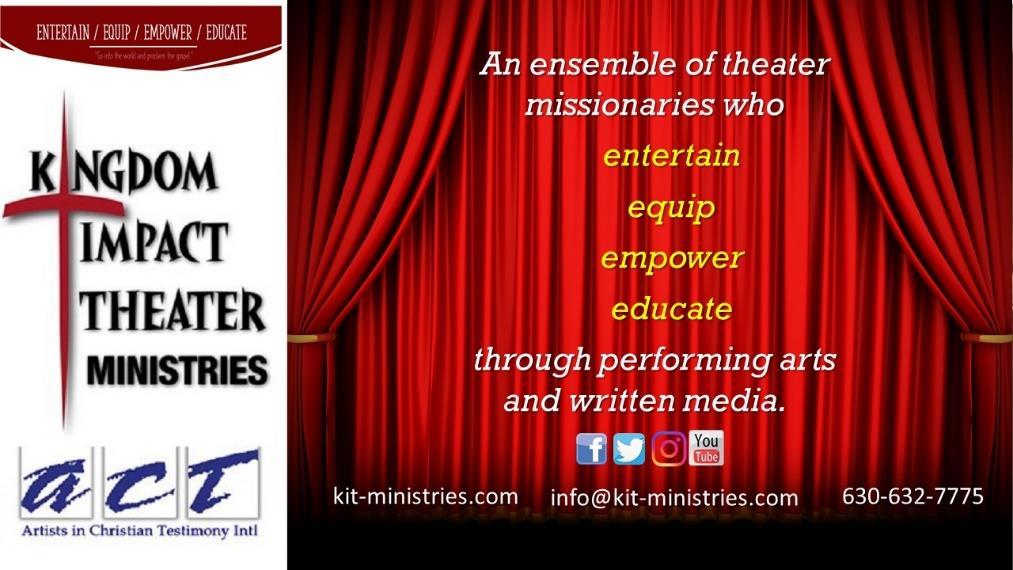
ABOUT THE COMPANY
Kingdom Impact Theater Ministries is an ensemble of theater missionaries who entertain, engage, empower and educate using performing arts and written media.
KIT Ministries is a department of Artists in Christian Testimony Intl, a fully registered 501(c)(3) organization serving 590 people in 402 Ministry Departments Serving 37 Countries & 40 States
Our purpose is to stimulate conversations on matters of faith, particularly the role of the religion of Jesus the Christ and its relation to daily life in homes and local communities.
Kingdom Impact Theater offers training and consultation in ensemble performance, personal storytelling, and group presentations. We also provide theater-based training in leadership skills such as interpersonal communication, team collaboration, and conflict management.
Our focus is working with smaller and mid-sized congregations, schools, community agencies and businesses who wish to improve relationships and expand cultural understanding.


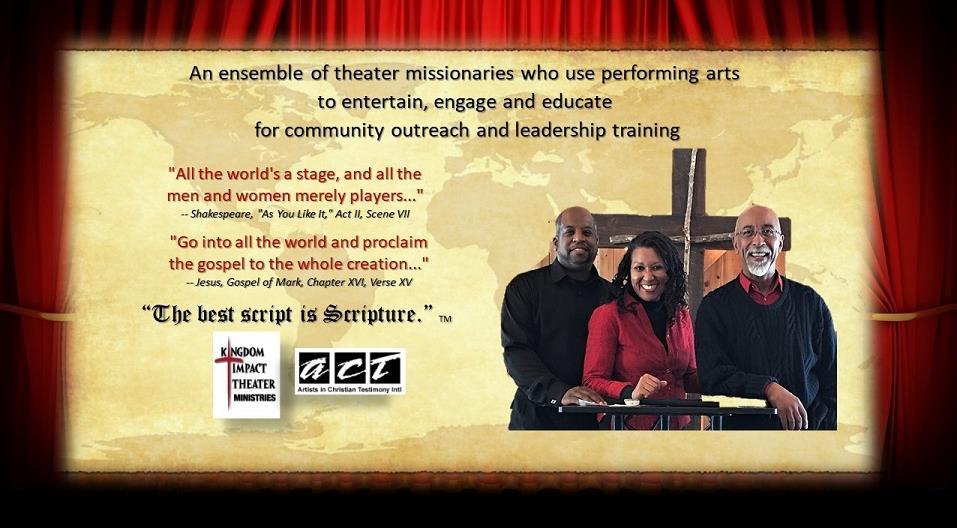
SUPPORTING OUR DREAM
Our dream is to present quality performances live and online without being a financial burden to groups wishing to use our programs.
We don’t believe money should prevent access to our message. We also know the reality of production.
We always inviting and welcoming contributions from individuals, groups or corporations who have a similar passion for our mission.
Partnering with Kingdom Impact Theater Ministries is about building relationships.
Monthly, one-time, quarterly or annual gifts allow us to adapt live content to emerging technologies with quality.
If you’d like to partner with us, Invest in the Dream and become a KIT Road Buddy, learn more at
actintl.givingfuel.com/kitdonations










